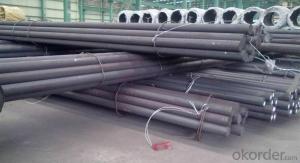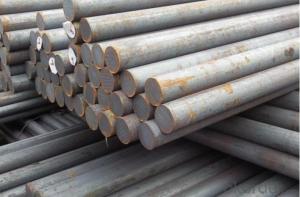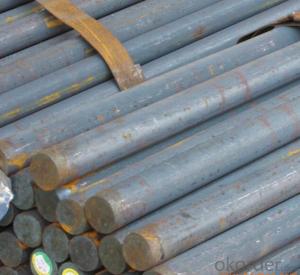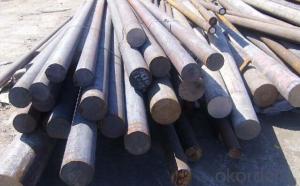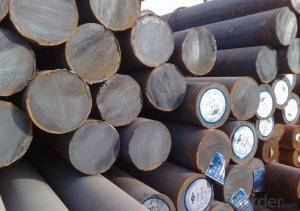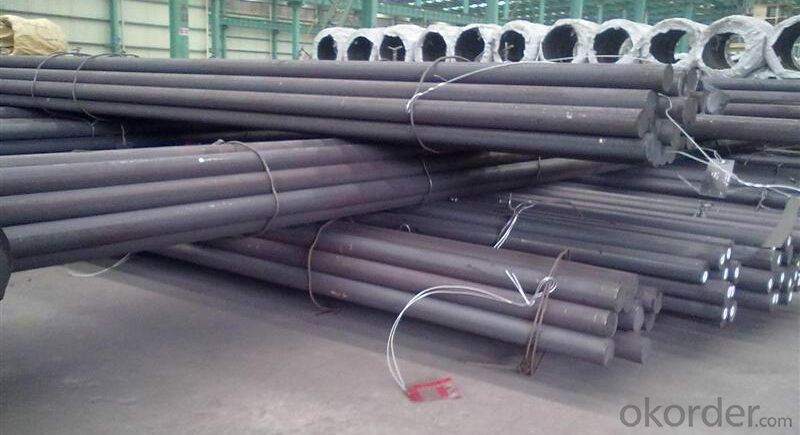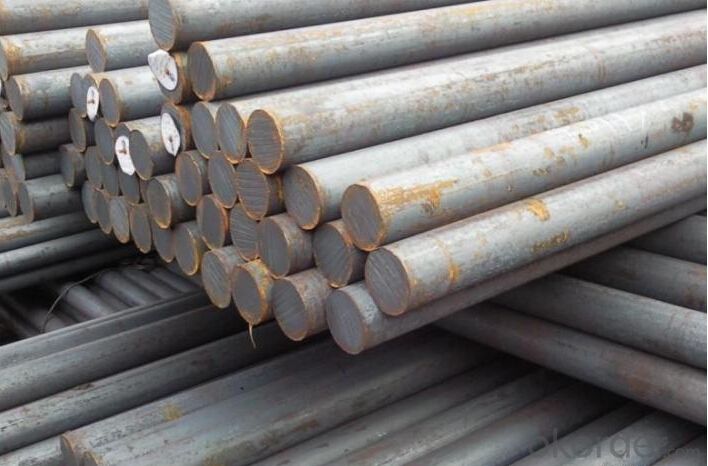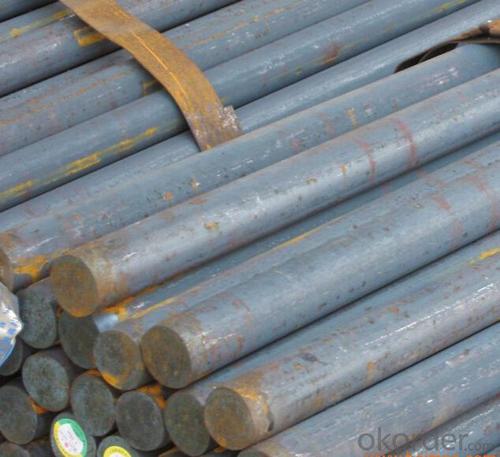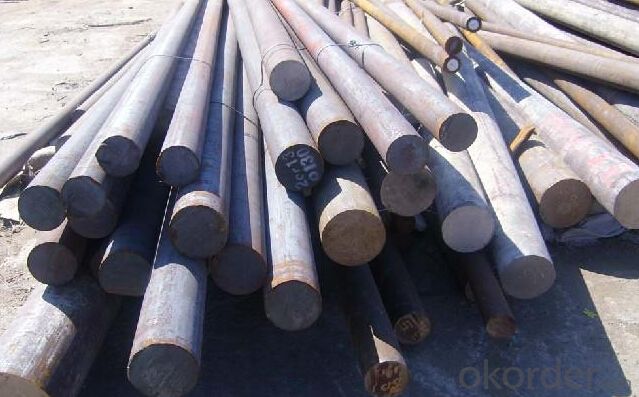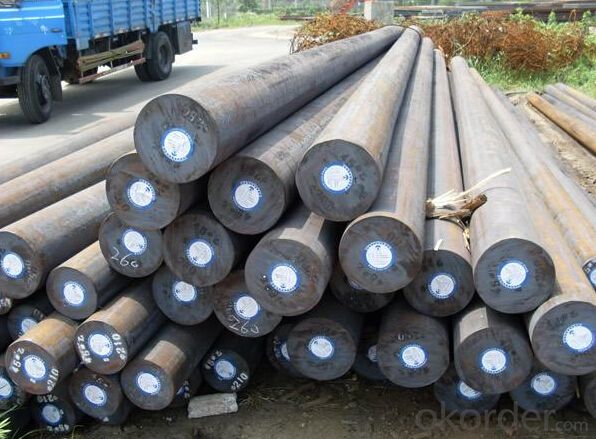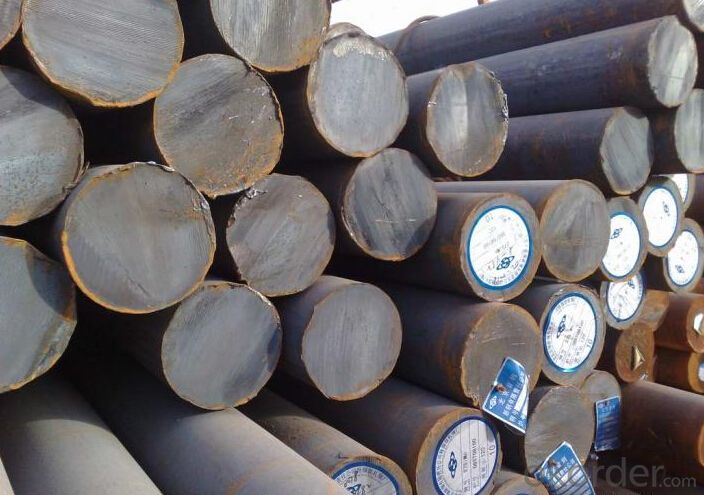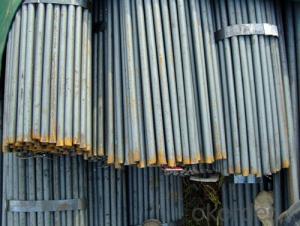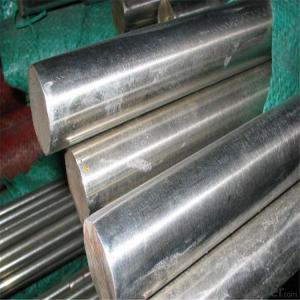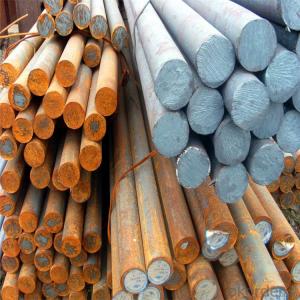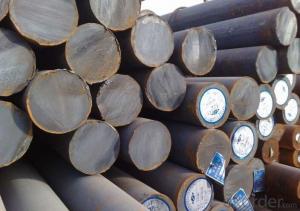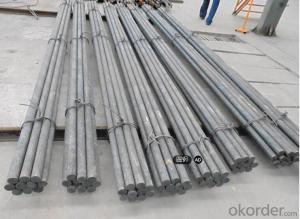Grade AISI1045 Din1.1191 JIS s45c GB45 Hot Rolled Carbon Steel Round Bar
- Loading Port:
- Shanghai
- Payment Terms:
- TT or LC
- Min Order Qty:
- 3 m.t.
- Supply Capability:
- 10000 m.t./month
OKorder Service Pledge
OKorder Financial Service
You Might Also Like
Specification
Grade AISI1045_Din1.1191_JIS s45c_GB45 Hot Rolled Carbon Steel Round Bar
Details of AISI1045_Din1.1191_JIS s45c_GB45 Hot Rolled Carbon Steel Round Bar
Name | SAE1045 Carbon Steel Round Bar |
Shape | Round Bar/Square Bar/Flat Bar/Plate/Wire |
Standard | GB/ASTM/SAE/AISI/DIN/JIS/EN/BS |
Surface Treatment: | Black/Peeling/Polished/Machined |
Delivery Condition: | Hot Rolled or Forged/Peeled or Black Surface |
Test | SGS/UT 100% Elements Testing |
Certificate: | ISO/Mill Certificate |
Service: | 24 hours online service / |
more than 20 years trading and manufacture | |
Quality Assurance: | the third party inspection, such as SGS, BV, TUV…etc. is acceptable |
Packaging Details: | Seaworthy Packaging or as per customer's packing instruction |
Specification of AISI1045_Din1.1191_JIS s45c_GB45 Hot Rolled Carbon Steel Round Bar
Grades Comparison
GB | ASTM | JIS | DIN | BS | NF |
45# | 1045 | S45C | C45 | IC45 08047 | C45 |
Chemical Composition
C | Si | Mn | Cr | P/S | Cr |
0.42-0.50 | 0.17-0.37 | 0.5-0.8 | ≤0.25 | ≤0.35 | 0.3-0.5 |
Sizes information
Sizes detalis | diameter | 16-320mm |
length | 3-12m(canbe customerized) | |
Sizes tolerance (max) | length | +/-100mm |
diameter | +/-2mm | |
Straightness | 3mm/m |
CNBM Introduction of AISI1045_Din1.1191_JIS s45c_GB45 Hot Rolled Carbon Steel Round Bar Supplier
CNBM International Corporation is the most import and export platform of CNBM group(China National Building Material Group Corporation) ,which is a state-owned enterprise, ranked in 270th of Fortune Global 500 in 2015.
With its advantages, CNBM International are mainly concentrate on Cement, Glass, Iron and Steel, Ceramics industries and devotes herself for supplying high quality series of refractories as well as technical consultancies and logistics solution.
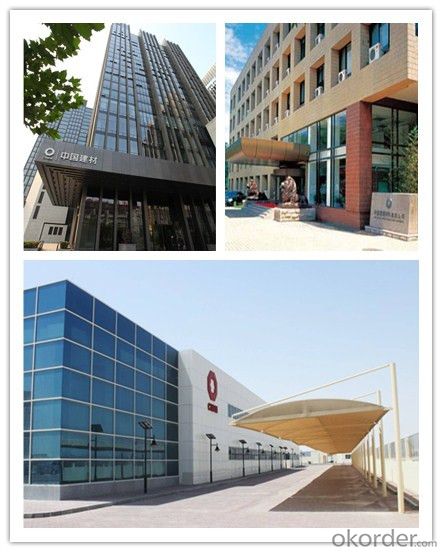
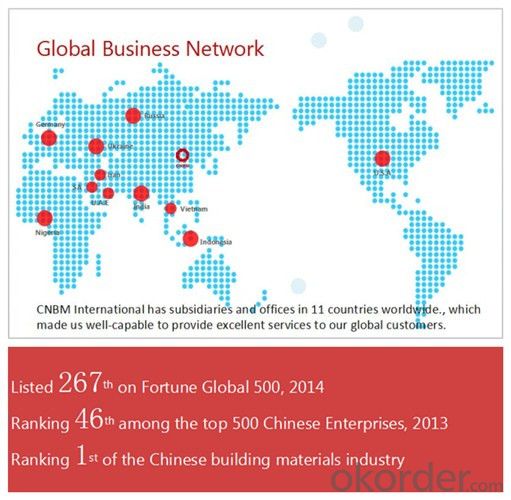
After-sale service |
|
Advantages
|
|
Packaging & Delivery AISI1045_Din1.1191_JIS s45c_GB45 Hot Rolled Carbon Steel Round Bar
Packaging Detail | Sea worthy packing /as per customer's packing instruction |
Delivery Detail | 15 ~ 40 days after receiving the deposit |
Products Show
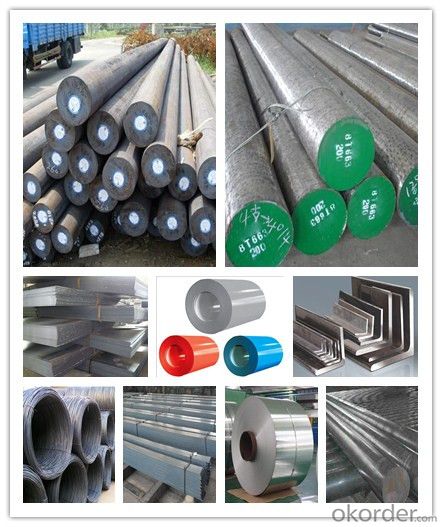
FAQ:
Are you a trading company or manufacturer? | Manufacturer |
What’s the MOQ? | 3 metric ton |
What’s your delivery time? | 15-35 days after downpayment received |
Do you Accept OEM service? | Yes |
what’s your delivery terms? | FOB/CFR/CIF |
What's the Payment Terms? | 30% as deposit,70% before shipment by T/T |
Western Union acceptable for small amount. | |
L/C acceptable for large amount. | |
Scrow ,Paybal,Alipay are also ok | |
Why choose us? | Chose happens because of quality, then price, We can give you both. Additionally, we can also offer professional products inquiry, products knowledge train (for agents), smooth goods delivery, excellent customer solution proposals. |
What's your available port of Shipment? | Main Port, China |
What’s your featured services? | Our service formula: good quality+ good price+ good service=customer's trust
|
Where are your Market? | Covering more than 160 countries in the world |
- Q: What are the different methods for improving the toughness of tool steels used in special steel?
- There are several methods available for improving the toughness of tool steels used in special steel applications. These methods are aimed at enhancing the resistance of the steel to fracture and increasing its ability to absorb energy without undergoing brittle failure. Some of the different methods for improving the toughness of tool steels include: 1. Alloying: The addition of specific alloying elements such as chromium, molybdenum, vanadium, and tungsten can significantly enhance the toughness of tool steels. These alloying elements form carbides within the steel matrix, which helps to improve its toughness. 2. Heat treatment: Proper heat treatment can greatly improve the toughness of tool steels. Processes such as quenching and tempering are commonly employed to achieve the desired level of toughness. Quenching involves rapidly cooling the steel from high temperatures, resulting in a hardened structure. Tempering follows quenching and involves reheating the steel to a specific temperature and then cooling it slowly. This process helps to relieve internal stresses and increases toughness. 3. Controlled cooling rates: By controlling the cooling rate during heat treatment, it is possible to optimize the toughness of tool steels. Slow cooling rates allow for the formation of a more uniform microstructure, leading to improved toughness. 4. Grain refinement: Refining the grain size of the steel can enhance its toughness. This can be achieved through processes such as hot working, controlled rolling, or adding grain refining elements like titanium or zirconium. 5. Surface treatments: Certain surface treatments, such as shot peening or nitriding, can improve the toughness of tool steels. Shot peening involves bombarding the surface of the steel with small metal or ceramic particles, inducing compressive residual stresses that enhance toughness. Nitriding involves diffusing nitrogen into the surface of the steel, forming a hard and wear-resistant layer that improves toughness. 6. Cryogenic treatment: Cryogenic treatment involves subjecting the tool steel to extremely low temperatures, typically below -100°C (-148°F), for an extended period. This process helps to refine the microstructure and reduce residual stresses, leading to improved toughness. 7. Powder metallurgy: Powder metallurgy techniques, such as hot isostatic pressing or sintering, can produce tool steels with improved toughness. By using a fine powder and applying high pressure and temperature, a more uniform and fine-grained microstructure can be achieved, resulting in increased toughness. Overall, the selection and combination of these methods depend on the specific requirements of the tool steel and the intended application. By carefully considering these techniques, manufacturers can enhance the toughness of tool steels, ensuring their suitability for demanding special steel applications.
- Q: How does special steel perform in extreme environments?
- Special steel is specifically designed to perform exceptionally well in extreme environments. It has excellent resistance to corrosion, high temperatures, and mechanical stress, making it highly reliable and durable. Special steel also maintains its strength and integrity even in challenging conditions, ensuring optimal performance and longevity in extreme environments.
- Q: What are the different automotive grades of special steel?
- There are several different automotive grades of special steel, including stainless steel, high-strength steel, advanced high-strength steel, and ultra-high-strength steel. These grades offer varying levels of corrosion resistance, durability, and strength, making them suitable for different automotive applications.
- Q: What is the role of special steel in sustainable manufacturing?
- Special steel plays a crucial role in sustainable manufacturing by offering enhanced durability, strength, and corrosion resistance, resulting in longer-lasting and more efficient products. It enables the development of lightweight yet robust components, reducing material consumption and energy consumption during production and usage. Additionally, special steel can be easily recycled, contributing to the circular economy and minimizing environmental impact.
- Q: Can special steel be used in automotive engine components?
- Yes, special steel can be used in automotive engine components. Special steel, also known as alloy steel, is specifically designed to have enhanced properties such as increased strength, toughness, and heat resistance. These properties make it ideal for use in critical engine components that are subjected to high temperatures, stress, and wear. In automotive engines, special steel can be used in various components such as crankshafts, camshafts, connecting rods, valves, and piston rings. These components are subjected to extreme conditions, including high temperatures, pressure, and rotational forces. Special steel provides the required strength and durability to withstand these conditions, ensuring reliable engine performance and longevity. The use of special steel in automotive engine components offers several advantages. Firstly, it increases the strength and load-carrying capacity of the components, allowing them to handle higher power and torque outputs. Secondly, special steel improves the fatigue resistance and durability of the components, reducing the risk of failure and extending their service life. Lastly, special steel can withstand the high temperatures and thermal cycling experienced in the engine, preventing deformation and maintaining dimensional stability. Overall, the use of special steel in automotive engine components is crucial for achieving optimal performance, reliability, and longevity. It ensures that the engine can withstand the demanding conditions it operates under, providing a smoother and more efficient driving experience.
- Q: Can special steel be used in the textile industry?
- Yes, special steel can be used in the textile industry. Special steel alloys, such as stainless steel, can be used for textile machinery components like needles, pins, and various parts of looms. These steel alloys provide excellent strength, corrosion resistance, and durability, making them suitable for demanding textile manufacturing processes.
- Q: What is the process of manufacturing special steel?
- The process of manufacturing special steel involves several steps. Firstly, raw materials such as iron ore, coal, and limestone are gathered and processed to create molten iron in a blast furnace. Next, impurities like carbon, sulfur, and phosphorus are removed through various refining techniques. Once the desired composition is achieved, the molten iron is transferred to a steelmaking furnace, where alloying elements like chromium, nickel, or manganese are added to impart specific properties. The mixture is then refined further to remove any remaining impurities and to adjust the temperature and composition. After refining, the molten steel is cast into various shapes such as blooms, billets, or slabs, depending on the desired end product. These primary forms are then subjected to hot rolling, forging, or extrusion processes to shape them into the desired final products, such as bars, plates, or wires. Finally, the manufactured steel undergoes heat treatment processes like annealing, quenching, or tempering to enhance its strength, hardness, and other mechanical properties. It is also subjected to quality control measures to ensure it meets the required specifications. Overall, the process of manufacturing special steel involves a combination of raw material preparation, refining, casting, shaping, heat treating, and quality control steps to produce steel with specific properties tailored to meet diverse industrial needs.
- Q: What are the safety considerations when handling special steel products?
- When handling special steel products, there are a few important safety considerations to keep in mind. Firstly, it is crucial to wear appropriate personal protective equipment (PPE) such as gloves, safety glasses, and steel-toed boots. This will help protect against potential injuries from sharp edges, heavy weight, or flying debris. Secondly, it is important to be aware of the weight and size of the special steel products being handled. Large or heavy items may require mechanical lifting equipment or assistance from others to prevent strain or injury. Additionally, it is necessary to inspect the special steel products for any defects or damage before handling them. This includes checking for cracks, fractures, or any other structural issues that could compromise their integrity. If any defects are found, they should be reported to the appropriate personnel and the products should not be used until they are deemed safe. Furthermore, special steel products may require specific handling techniques or tools. It is important to follow the manufacturer's guidelines and instructions to ensure safe handling. This may include using specialized lifting equipment, clamps, or supports to prevent accidents or damage. Finally, it is essential to have proper training and knowledge on how to handle special steel products safely. This includes understanding the weight limits of lifting equipment, knowing how to properly secure and stabilize the products, and being aware of any potential hazards or risks associated with the specific type of steel being handled. By following these safety considerations, the risk of accidents, injuries, or damage can be minimized when handling special steel products.
- Q: How does special steel contribute to the electrical conductivity of products?
- Special steel can contribute to the electrical conductivity of products in several ways. Firstly, special steel alloys can be formulated with specific chemical compositions that enhance their electrical conductivity. For example, adding elements such as copper, silver, or nickel to the steel can increase its electrical conductivity by providing more pathways for the flow of electric current. Additionally, the microstructure of special steel can be manipulated to improve electrical conductivity. By controlling the grain size and orientation of the steel, it is possible to reduce the resistance to the flow of electrons, thereby increasing the overall conductivity of the material. Furthermore, special steel can be heat treated or subjected to other processes to enhance its electrical conductivity. Heat treatment techniques like annealing or tempering can help to remove impurities and improve the crystal structure of the steel, resulting in improved electrical conductivity. Moreover, special steel can also be designed to have low magnetic permeability, which means it exhibits less resistance to the flow of magnetic fields. This property is beneficial for applications where electromagnetic interference needs to be minimized, such as in electrical connectors or transformers. In summary, special steel contributes to the electrical conductivity of products through various means, including chemical composition, microstructural control, heat treatment, and low magnetic permeability. By optimizing these factors, special steel can significantly enhance the performance of electrical components and systems.
- Q: How does special steel perform in terms of wear resistance in abrasive environments?
- Special steel is known for its exceptional wear resistance in abrasive environments. The unique composition and heat treatment processes used in the production of special steel result in a higher hardness level compared to standard steels. This increased hardness makes special steel highly resistant to wear caused by abrasive particles or surfaces. In abrasive environments where friction and contact with hard materials are prevalent, special steel exhibits excellent performance. It can withstand the erosive effects of abrasive particles, such as sand, rocks, or metal fragments, without significant wear or damage. This durability makes special steel an ideal choice for various applications, including mining equipment, cutting tools, industrial machinery, and automotive components. Moreover, the wear resistance of special steel is not only limited to its surface but also extends throughout its structure. This means that even if the surface of the steel is scratched or abraded, the underlying material remains highly resistant to wear. This characteristic ensures a prolonged lifespan of components made from special steel, reducing maintenance costs and downtime. Furthermore, special steel can maintain its wear resistance even under high temperatures. This property is particularly advantageous in abrasive environments where friction-induced heat can accelerate wear. The ability of special steel to retain its hardness and wear resistance at elevated temperatures ensures its effectiveness in demanding applications like high-speed machining or hot forging. Overall, special steel outperforms standard steels in terms of wear resistance in abrasive environments. Its superior hardness, structural integrity, and temperature resistance make it an excellent choice for applications where durability and longevity are essential.
Send your message to us
Grade AISI1045 Din1.1191 JIS s45c GB45 Hot Rolled Carbon Steel Round Bar
- Loading Port:
- Shanghai
- Payment Terms:
- TT or LC
- Min Order Qty:
- 3 m.t.
- Supply Capability:
- 10000 m.t./month
OKorder Service Pledge
OKorder Financial Service
Similar products
Hot products
Hot Searches
Related keywords
